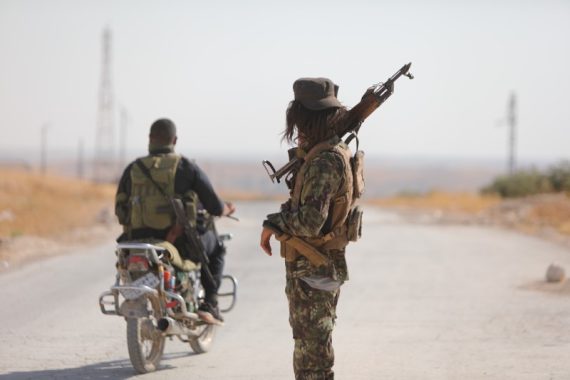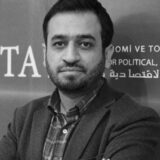W
e are currently witnessing a remarkable simultaneous mobilization in Syria and Iraq. With the U.S. military mobilization in Iraq, the ethnic and sectarian tensions in Kirkuk have come to the forefront. Shiite groups and Kurds are in a power struggle both between themselves and with the elements they perceive as hostile to their cause.
While all this is happening in Iraq, in Syria, demonstrations in regime-controlled areas, increasing attacks on Idlib, and finally the Arab uprising in the Deir ez-Zor region have deeply shaken the country. In fact, serious demonstrations have been taking place in the regime-controlled areas for some time, with occasional manifestations in Damascus, Daraa, and Latakia, but the Suwayda region has been at the center of the demonstrations.
When the economic problems in the Druze minority-populated region, coupled with the catastrophic collapse of the Syrian lira, threatened food security, people organized and took to the streets to demonstrate. Under the mismanagement of the Syrian regime and international sanctions, the country is becoming increasingly unlivable.
Infrastructure and superstructures in the country have been severely damaged and cannot be replaced, while energy and food supply security cannot be ensured. A functioning ecosystem is almost non-existent. There is also large-scale drug production and trafficking, which is managed by the regime’s military elements, and the ongoing economic problems in Lebanon and Russia’s impasse in Ukraine are putting even more pressure on the Syrian regime.
In such an atmosphere, the regime is trying to use military clashes to change the agenda by targeting Idlib and legitimizing its existence. Of course, it should be underlined that one of the most important reasons for the economic bankruptcy in Syria is the PKK/YPG’s control of the country’s most important energy resources, fertile agricultural areas, and water basins. A closer look at the uprising in Deir ez-Zor will provide further insight (into the dynamics at play.
Arab tribes fight back again
The Deir ez-Zor Governorate is a province on the Euphrates River in Eastern Syria bordering Iraq, which is particularly rich in oil and natural gas resources. It has a Sunni Arab population under the control of tribes. The Al-Abid, Kalbiyya, Shammar, Zubayd, Duliam, Jabur, Tayy, Abu Saraya clan, and al-Rifai tribes, primarily the Al Uqaydat and Albu Saraya,a section of the Baqqara tribe, are present in the city. The city of Deir ez-Zor is 450 kilometers from Damascus and about 200 kilometers from the borders with Turkey.
The city of Deir ez-Zor came under the control of the opposition during the Syrian revolution, and was then occupied by DAESH for a long time. It was captured by the YPG, the Syrian extension of the PKK terrorist organization, and Arab elements affiliated with it, with the air and ground support of the United States. The region is currently controlled by the PKK/YPG-controlled SDF and its autonomous Military Council, and is also within the borders of the terrorist state that the PKK is trying to establish in the region.
In Deir ez-Zor, where small clashes and demonstrations have occurred from time to time in the past, larger clashes erupted recently when Abu Havle, the head of the Military Council, was invited to a meeting by PKK/YPG members and detained. Armed forces from Deir ez-Zor-based Arab tribes such as the Al Uqaydat and Baqqara mobilized and managed to expel PKK/YPG elements from many villages and towns.
When we look back a little, we see that a significant part of the Arab tribes in the region did not want to recognize the authority of the PKK/YPG, that they have rebelled from time to time, and that peace was achieved with the intervention of the U.S. Meanwhile, the PKK/YPG terrorist organization has always tried to eliminate possible threats through assassinations.
Sheikh Mutshir Hammoud Jad’an Hifil, the leader of the Al Uqaydat tribe, who led the tribal uprising, was killed in August 2020. Again, in January 2021, Sheikh Hajj Talyush, one of the leading figures of the Al Uqaydat tribe, was assassinated. As a result of the killing of the tribal leader in 2020, there was a wave of rebellion, and members of the tribe expelled PKK/YPG elements from the tribe’s center, Zyban, and some surrounding villages.
In recent events, major tribes have set up war tents and launched a broader rebellion, driving the PKK/YPG out of many areas. After the capture of several villages in the countryside of Manbij, Russia stopped the tribes’ advance with aerial bombardment. Likewise, serious clashes took place on the Tel Abyad and Tel Temir lines. The U.S. has remained relatively silent, trying to play a mediating role rather than taking sides.
It seems that with the PKK/YPG terrorist organization’s countermoves, the lack of joint action by the tribes in the region, and mediation by the U.S., the situation has started to de-escalate. It appears that the PKK/YPG-affiliated elements have suppressed the tribal forces for the time being, but it can be surmised that during negotiations, the PKK/YPG made concessions by giving the tribal organizations more autonomy in regions such as Deir ez-Zor.
It should also be emphasized that the recent rebellion has once again shown that despite all the support provided by the U.S., the PKK/YPG has not been able to establish a sustainable presence in the region due to its demography.
The determinism of demography
Through its engagement first with the Assad regime and then with the U.S., the PKK/YPG has come to dominate an area of about 50,000 sq km in Syria. It controls Manbij and Tal Rifaat west of the Euphrates under the protection of Russia and the Assad regime, while east of the Euphrates it controls areas such as Al-Hasakah and Deir ez-Zor under the security umbrella of the United States.
These regions cover most of the country’s energy resources, agricultural areas, and water basins, and are home to around 2.5-3 million people. Currently, 80% of the population are Arabs. Although the U.S. has tried to integrate Arabs into the existing system by creating the SDF, the PKK/YPG’s deviant ideological tendencies and the terrorist hierarchy imposed by Qandil ensure that Arabs are only figuratively included in this system.
Some tribes, such as the Shammar, have been more active in the system, but the majority of Arab tribes have been reluctant to participate and have only been forced to do so by the incentives and pressures of the Washington administration. After the move against the relatively autonomous Deir ez-Zor Military Council, the tribal structures have once again raised the flag of rebellion.
Are these events based on a natural reaction of the Arab tribes against the PKK/YPG terrorist domination? Or, is there an attempt by the countries supporting this rebellion from the outside and specifically the U.S. to create a different design on the ground, as has been expressed recently? At first, the PKK/YPG tried to package this Arab uprising through DAESH—as it always does—and produced fake videos to create the perception that the uprising was being carried out by DAESH supporters.
Then, it moved on to the second scenario, claiming that the Assad regime and Iran were behind these tribes. The main goal here was to suppress the rebellion more easily by getting Washington’s support and then consolidate its power in the region through the U.S. The Russian Air Force bombing of tribal forces in Manbij rendered this scenario largely ineffective.
Another scenario was for the rebellion to be an effort by Washington to break the growing influence of the Tehran government and create a tribal belt that would extend to the Jordanian border, cutting off Iranian routes into Syria through Iraq. Doing so would mean directing the YPG further northward and empowering the Arab tribes by making them independent of the YPG. The fact that the PKK/YPG made some concessions in favor of the tribes in the aftermath of the recent events strengthens this prospect.
A zone that would extend to the line in the al-Tanf region, which the U.S. controls together with Syrian opposition forces, is an attempt to cut the border crossing between Al-Bukamal in Syria and Al-Qaim in Iraq. If this step can be taken, Iran’s logistics line from Iraq to Syria will be completely cut, Tehran’s influence in the country will be broken, and Israel’s security will be strengthened.
Of course, if this scenario is to be realized, the PKK/YPG mustn’t be alienated. Some regional experts believe that the U.S. job is made easier by taking these steps through the related tribal rebellion. However, the Washington administration’s course of action so far, especially during the Biden era, indicates that it has not and will not engage in such risky large-scale moves.
Recommended
Another scenario is that Turkey supports and directs the Arab tribes. Throughout the Syrian civil war, Turkey has always worked closely with Arab tribes and valued them. In the aftermath of the events, Turkish President Recep Tayyip Erdoğan emphasized that the PKK presence in the region was unacceptable and that the areas in question belonged to the Arab tribes.
Likewise, the Turkish Armed Forces (TAF) did not interfere with the mobilization of the Arab tribes in the areas under their control and influence, and even facilitated their mobilization against the PKK terrorist organization. However, neither the TAF nor elements of the Syrian National Army (SNA) were involved in the fighting.
It seems that Turkey does not want to see another major wave of conflict in Syria nor does it want a new escalation with its counterparts, such as the U.S. and Russia, in the country. Diplomatic contacts with the Assad regime continue under Russian mediation. Therefore, although Ankara has supported the justified rebellion of Arab tribes against the terrorist organization through certain means, it would be wrong to read Turkey as the state and power behind this rebellion.
In summary, Turkey’s thesis that “you cannot fight one terrorist organization with another terrorist organization” has once again been vindicated. The recent events in Eastern Syria have also had meaningful consequences in terms of showing that the U.S. cannot build permanent presence in the region with the PKK/YPG terrorist organization against the demographic realities and sociology of the region.
Finally, even if the Deir ez-Zor rebellion is suppressed, it has clearly revealed one truth: demographic realities will eventually win in the region, and the efforts to establish a so-called terrorist state on an ethnic minority through a terrorist organization will come to naught.





